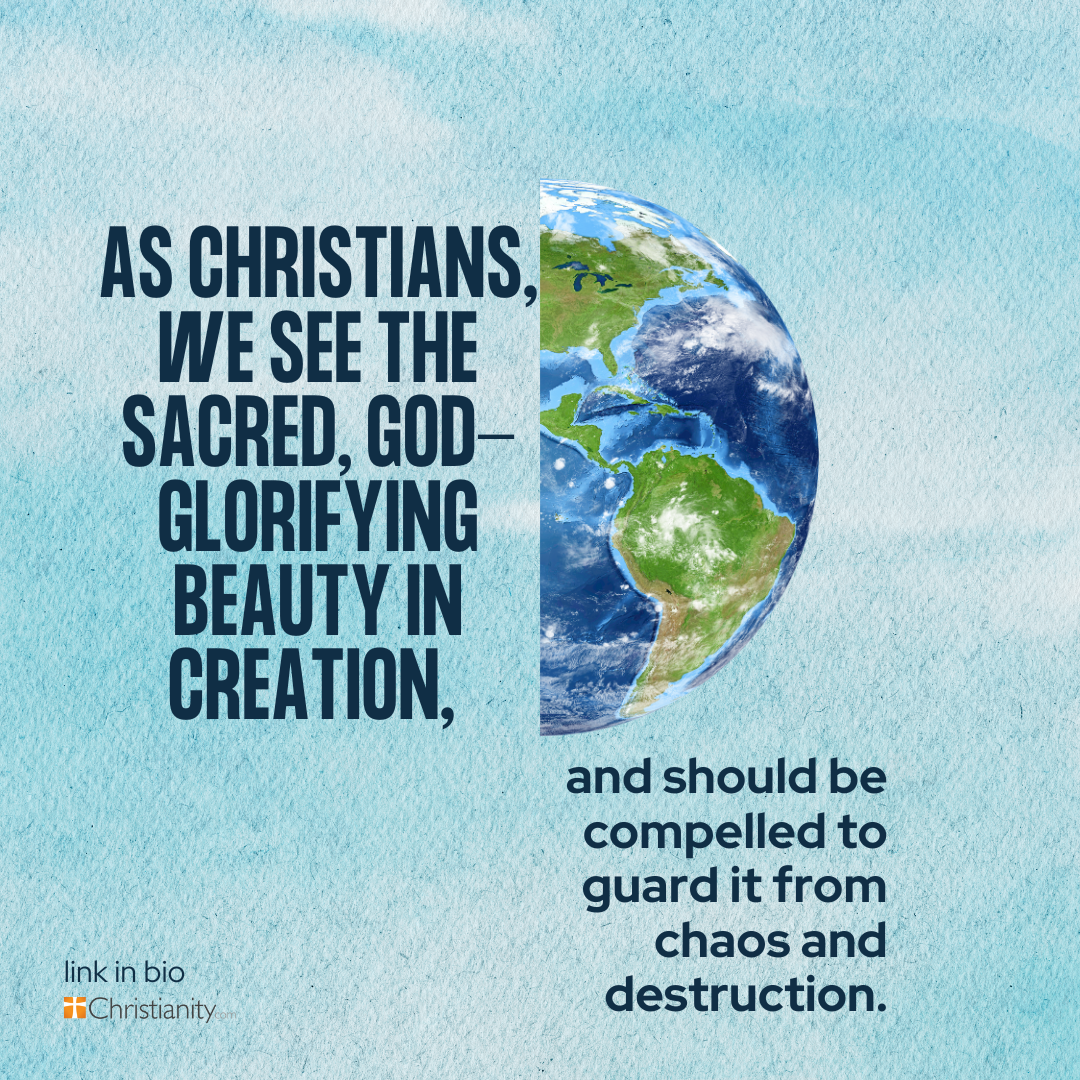Genesis 2:15 urges believers to take an active role in caring for our planet. The text reads, “The Lord God took the man and put him in the Garden of Eden to work it and take care of it.” The Hebrew words used in the text are abad (to serve) and Shamar (to keep, preserve). These words guide us towards a stewardship role as inhabitants of God’s planet.
We cannot just shrug off the real challenges that humanity has ushered into our world, and the growing Christian movement that just says we should throw up our hands and go on abusing our planet until Jesus returns is not biblical.
We should let the world go to hell because we know future tribulations are not how we handle our day-to-day lives, and it’s not how we should approach the very real responsibility we have to take care of our world. As Christians, we see the sacred, God-glorifying beauty in Creation, and should be compelled to guard it from chaos and destruction.

As followers of Christ, we are called to serve one another in love (Galatians 5:13), which means we must not leave a mess for our neighbor to clean up. That neighbor could be our actual neighbor who does not want your waste on their lawn, and it also can be the generations that God has very real plans for.
Let’s not trash this place we’ve been given for them.
The Problem Is Real
The numbers don’t lie. Our world faces some real challenges currently, and will escalate in the years to come without our intentionality and creativity as the Earth’s inhabitants.
2024 was the hottest year ever recorded, as documented by the European Union’s Copernicus Climate Change Service.
According to the UN’s Intergovernmental Science-Policy Platform on Biodiversity, a million animal and plant species are threatened. The loss of these God-inspired plants and animals should bring real grief to our hearts, as it’s the passing of God’s created beauty into nothingness.
Storms are intensifying in power and impact. Climate and weather-related disasters are five times more prevalent than they were 50 years ago. The cost of human lives and the price of rebuilding in the wake of these disasters is staggering.
Desertification, land degradation, and drought are consuming larger parts of usable land. About 40% of all land area worldwide is already considered degraded. This impacts many things, but most importantly, it matters for food production.
Alarmingly, the World Health Organization notes that about 250,000 surplus deaths per year will be caused by climate change in the years to come. These deaths will be caused by malnutrition, malaria, and heat stress.
In addition to the many struggles facing our planet, people are experiencing great levels of anxiety about its state. A 2021 Lancet study of 100,000 youth in 10 countries noted that 59% of those surveyed said they were very or extremely anxious about climate change.
People are concerned because the changing climate brings a sense of impending doom, and they don’t know where to turn for hope!
Christians Can Make a Difference
The good news is that as believers we don’t have to live with extreme anxiety because we know the one who holds the stars, and he has a plan for every living thing on Earth. He comforts us with his promise to provide fresh mercies each morning (Lamentations 3:22-23).
We can share this love and peace with those worried about where the world is headed with love and care. Believers also know that God has told us that the end times will come, when we least expect it, and we need to be ready to meet Jesus when he appears.
Until that unknown day we are to live peacefully (Romans 12:18), caring for our world with our best efforts (Matthew 6:26).
1. Engage with the Issue
We must push off the inclination to live apathetically about how our habits impact our world and do our best to become more informed and engaged.
Even if it’s just starting small, with more conversations in your home and community about how to care for the planet, avoid excessive waste, and buy more sustainable products, this alone makes a difference.
2. Get Involved with Local Efforts to Nurture God’s Creation
As believers, we can start connecting with local efforts to create a more Earth-friendly world. Start or join a community garden. Become a political activist for initiatives to cut down on waste and rampant consumerism in our country and beyond. Raise awareness in your locality about the specific environmental threats your community faces and ways to curb the tide of destruction.
3. Become a Conscious Consumer
Find ways to support products and practices that are better for the planet. My personal favorite is thrift shopping! But there are a million ways to stop wasting so much and be more thoughtful about consuming products. Can we reuse more of the items in our home or repurpose them? Are there brands that avoid unnecessary plastic or have more sustainable products you can support? Could you donate something rather than just throwing it out? Can you compost your scrap food or get some useful backyard chickens to help consume that waste? There are so many ways we can take small steps in our homes to push back on the extremely wild culture of consumption we live in.
4. Make This an Issue the Church Engages
Make this an issue the church cares about. We want our kids to care about the birds of the sky, those fish in the ocean that are currently being crowded out by our garbage, and the air we breathe. Let’s talk about God’s care for this cause at church and kids’ church, and end this idea that we have no responsibility to steward God’s Earth.
Honestly, I hope God returns to a pristine planet and feels really good about lending it to us for however many thousands of years we get to live here before his judgment comes. We should fully embrace a posture of love and care for God’s handiwork. We don’t have to live as alarmists, but we can be a force towards restoration, preservation, and conservation as a faith community.
Sources:https://relevantmagazine.com/justice/climate-anxiety-is-real-how-should-christians-respond/




